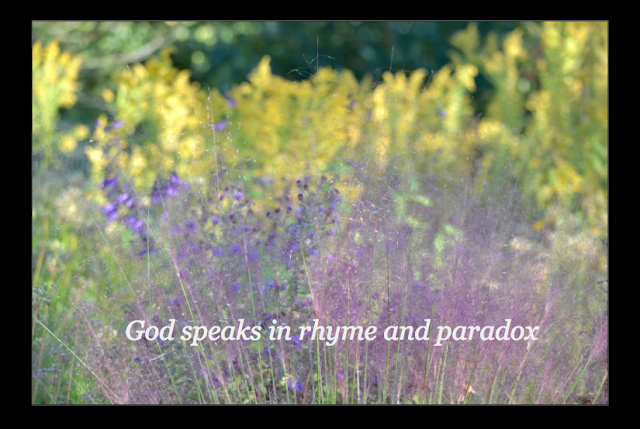“… I’ve traveled through my history, /From certainty to mystery. /God speaks in rhyme and paradox…” Carrie Newcomer & Michael Mains “Leaves Don’t Drop They Just Let Go”
I grew up near a small town with 3+ churches of the Christian variety along the few blocks of the main street. As a child, I was taught and believed the two other than our own were going to hell and our mission was to save them. The exclusionary tactic might have purpose to keep children from straying, but there’s also a teaching about growing past childish things. I believe spiritual growth includes moving from “certainty to mystery” and accepting the humility invoked in paradox. (I’m also wondering if the texture of certainly can be reborn, but that’s another story.)
I remember the day when JFK got elected and the sense of despair in our church because we feared Catholics took their orders from Rome. We each travel through our histories and maybe we’ve grown a bit more tolerant now, but distrust still pervades our nation. The religion of love can be hard to find.
I cannot claim to understand why we have difficulty grasping a religion of love with “One God and many faiths,” but I have a few ideas and an awesome passage from Alone with the Alone. Perhaps a basic requirement necessary to advance beyond childish belief structures involves a capacity to engage paradox, in this case, the One and the many. We accept many roads to Rome; why not many pathways to God?
I suspect the difficulty comes in deeper emotional obstacles, especially 1) Fear and 2) Power:
1. Fear: When it comes to going to Hell, most of us don’t want to be wrong about God. Even if there’s no such thing as Hell or if it’s not all brimstone (whatever that is), still any risk-possibility runs high on the scary scale. So it’s comforting to have others alongside who are taking the same position (i.e., religion) about what is required to go to heaven. To take responsibility for working out one’s salvation without the confirmation of others is a hard thing to do.
2. The Power thing probably starts off with parents taking care of children who need protection from danger. You must do a, b, & c; you must not do x, y, & z. . . and if you don’t, God will get you! The problem is that power is addictive. Both the “high” from controlling and the “security” of being controlled can be hard to escape. As just noted regarding Fear, going alone is difficult.
Unfortunately for #1 and #2, humans seem to be made as individuals, not as clones. To the best I can get it, my spiritual path requires and rejoices in progressing toward a closer fit with my unique God-given character and destiny. That’s a life-long pathway. Yes, we do have opportunities and responsibilities for sharing, and still ultimately, essentially, faith is a one-person fit. One God; many faiths.
This idea is far from original. Among the books gathered on my desktop at this time are Divine Love (Ed. by Jeff Levin & Stephen Post), Buber’s I and Thou, Nasr’s Religion and the Order of Nature, Marcus Borg’s The God We Never Knew, and God in Search of Man by Abraham Joshua Heschel. (I haven't read them all.) In his introduction to A Year With Rumi, Coleman Barks surveys a wonderfully wide range of “Disrepectable Unaffiliated Mystics, though most are not at all disreputable, and many are devoutly affiliated,” and he speculates that blasphemy “is in whatever insults the soul” (p. 7).
As promised earlier, I especially find comfort and direction in teachings such as Henry Corbin’s interpretation of Ibn ‘Arabi (Alone with the Alone). The passage takes some careful reading as we should expect if we are to venture into the name and nature of “God”:
God: “a word which each man understands according to his aptitude, his knowledge of himself and the world around him, or else it is a symbol for the form of his personal belief… Thus the faiths differ with the Lords, just as the Lords differ, although all the faiths are forms of the one faith, just as all the Lords are forms in the mirror of the Lord of Lords. . . it does not follow that the Godhead condescends with equal docility to all determinate beings; God is not limited to the manner in which He is epiphanized for you and makes Himself adequate to your dimension. And that is why other creatures are under no obligation to obey the God who demands your worship, because their theophanies take other forms. The form in which He is epiphanized to you is different from that in which He is epiphanized to others. God as such transcends (munazzah) all intelligible, imaginable, or sensible forms, but considered in His Names and Attributes, that is, His theophanies, He is, on the contrary, inseparable from these forms, that is from a certain figure and a certain situs in space and time. . .” [pp. 309-10, fn51]
The image of the God whom the faithful creates is the Image of the God whom his own being reveals, his own being revealed by the “Hidden Treasure.” Thus it is the Image of him who first imagined His being (created it, that is, revealed it to being) as his own form or Image, or more exactly his mirror image. . . the symbol of the Self. [p. 266]

No comments:
Post a Comment